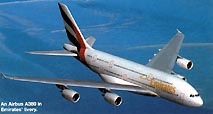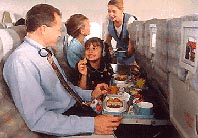Emirates, the Dubai-based international carrier, has been named Airline of the Year 2001 in the largest ever global survey of airline passengers. 2.7 million
votes were submitted over a period of nine months from around the world, culminating in the awards process.
Conducted by Skytrax research of the UK, the survey asked passengers to rank airlines by the quality of the product and service provided to passengers.
 Soon to come - Emirates Airbus A380, a
double-decker
Soon to come - Emirates Airbus A380, a
double-decker
Edward Plaisted, MD of Skytrax, said the survey was unique from a number of perspectives, “This was a truly global voting process and not restricted
by influences one often sees with polls conducted on a regional basis. It allows for smaller airlines to compete on an even basis with the world’s majors. We do not look at
frequent flyer programs or other commercial influences, but concentrate wholly on the quality of product and service that a customer experiences - the end result portrays the
truest picture of a quality airline.”
 Emirates award winning in-flight
catering - gourmet meals for all
Emirates award winning in-flight
catering - gourmet meals for all
Maurice Flanagan, Emirates Group managing director said, “We are delighted to be recognized by customers in this worldwide airline survey. The award
testifies to the unbeatable product that we offer passengers – a combination of the most modern aircraft, latest on-board facilities and the highest standard of service in the
sky. We continually set the standard as we further expand our operations around the globe; we will continue to put customers first by redefining the quality of our product.”
 Mr. Soonthorn Suree Manager Thailand,
Myanmar and Laos
Mr. Soonthorn Suree Manager Thailand,
Myanmar and Laos
Monthly ranking snapshots were taken throughout the survey process and Emirates was a strong performer during the whole voting period, resulting in scooping
the prestigious Airline of the Year title.
Emirates is the world’s fastest growing major airline, operating to 57 destinations in 39 countries around the world from its base at Dubai International
Airport.
Second position went to Singapore Airlines, with Cathay Pacific third, British Airways fourth and Thai Airways fifth.
Singapore Airlines just missed out in the Best Airline Asia Award to Cathay Pacific, whilst British Airways outranked by Lufthansa for the Best Airline Europe
Award.
Customers were asked to rate airport services (at the home base for an airline), cabin seating standards, onboard catering, in-flight entertainment and cabin
staff service. Separate nominations were made for airlines offering the best product, best staff service and regional best airline.
Out of 2.7 million votes cast, 32 percent regularly traveled in First or Business class on corporate business, 24 percent traveled on Economy class for
corporate sponsors and 44 percent traveled in Economy class for leisure.
The Skytrax research survey is an independent project, conducted without any form of third party sponsorship or influence. Funding for the project was
based on the sale of detailed survey analysis and reports to interested airlines.
Applying a ‘without fear or favour’ policy, Skytrax say the survey provides one of the most meaningful studies of passenger opinions and has become
one of the most prestigious recognitions of airline standards.